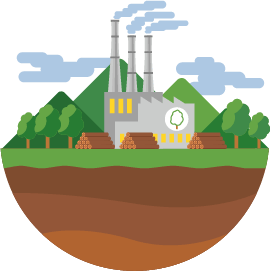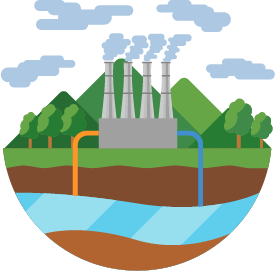Renewable energy refers to the power output derived and replenished from natural sources that can be used to generate electricity, heat, or mechanical power, some examples being solar power, wind power, and energy generated from biomass. During the last few decades, the share of renewables in global energy consumption has grown significantly reaching 11% in 2019. However, despite the ‘clean’ and ‘green’ labels, renewable energy is also associated with certain disadvantages.
What is renewable energy?
Renewable energy refers to the type of clean (decarbonized) energy that is sourced and replenished from natural processes at rates that are equal to or faster than the rate at which the energy is consumed. Over the last few decades, a broad range of technological innovations have been developed to capture, store and use renewable energy. As a result, the share of renewables used in global final energy consumption rate has grown significantly. In 2019, for example, about 11% of the energy consumed at the global level was derived from natural sources which represents a 2% increase since 2009.
Types of renewable energy
‘Green’ or ‘renewable’ energy is obtained from sources that can be regenerated or restored in a natural way:
 Solar energy – this is the energy radiated from the sun that is captured in the form of heat and light. It is often used to provide electricity, heat, or lighting for households and industrial buildings. Solar installations require large surfaces that are required to be free of any obstacles that would block the sunlight
Solar energy – this is the energy radiated from the sun that is captured in the form of heat and light. It is often used to provide electricity, heat, or lighting for households and industrial buildings. Solar installations require large surfaces that are required to be free of any obstacles that would block the sunlight
 Wind energy – this is one of the most widespread type of renewable energy and is derived by using kinetic technology to convert the wind into mechanical energy or electricity. The turbines have to be installed in areas where there are high wind to yield the best results
Wind energy – this is one of the most widespread type of renewable energy and is derived by using kinetic technology to convert the wind into mechanical energy or electricity. The turbines have to be installed in areas where there are high wind to yield the best results
 Biomass energy – this is obtained by burning organic materials derived from plants and animals to produce heat or steam. While this process does involve the release of carbon emissions, it is considered a cleaner and more energy-efficient process compared to the energy produced by petrol or coal
Biomass energy – this is obtained by burning organic materials derived from plants and animals to produce heat or steam. While this process does involve the release of carbon emissions, it is considered a cleaner and more energy-efficient process compared to the energy produced by petrol or coal
 Tidal or ocean energy – this is a form of renewable energy derived from natural water movements whereby the mechanical force produced by oceanic waves and tides is converted into electricity or other useful forms of power. Tidal energy is the least utilized due to several technical, economic, and environmental barriers
Tidal or ocean energy – this is a form of renewable energy derived from natural water movements whereby the mechanical force produced by oceanic waves and tides is converted into electricity or other useful forms of power. Tidal energy is the least utilized due to several technical, economic, and environmental barriers
 Geothermal energy – this is produced from capturing the heat and steam that comes from below the earth’s surface. This type of renewable can become even ‘cleaner’ if the water and the steam used to generate energy is transported back into the earth. The access to geothermal resources depends on the geographical location
Geothermal energy – this is produced from capturing the heat and steam that comes from below the earth’s surface. This type of renewable can become even ‘cleaner’ if the water and the steam used to generate energy is transported back into the earth. The access to geothermal resources depends on the geographical location
 Hydro energy – represents another widely used form of renewable energy whereby the natural or forced flow of the water creates kinetic power that can be transformed into electricity. This type of energy is considered more constant and reliable compared to other types although hydroelectric dams are often associated with negative environmental impacts and legal issues attributed to water rights.
Hydro energy – represents another widely used form of renewable energy whereby the natural or forced flow of the water creates kinetic power that can be transformed into electricity. This type of energy is considered more constant and reliable compared to other types although hydroelectric dams are often associated with negative environmental impacts and legal issues attributed to water rights.
Although renewable energy is considered clean and non-polluting, it is nevertheless associated with a number of disadvantages. First of all, renewables are flow-limited in terms of their output which means that the productivity of energy installations depends directly on the weather, climate, and other natural phenomena. Moreover, the manufacturing and transportation of such installations produce certain emissions and pollutants and, lastly, the equipment designed to capture and store the renewable energy requires the use of significant land space which in turn may have a negative environmental impact (e.g., loss of habitat, water pollution, drilling, etc.).
Nonetheless, renewable energy involves less harm to the environment compared to traditional energy sources such as fossil fuels.
DevelopmentAid is the leading provider of business intelligence and recruitment tools designed to assist those active in the development sector. Join today and gain access to exclusive information on upcoming funding opportunities (tenders and grants) from the largest bilateral and multilateral donors.

